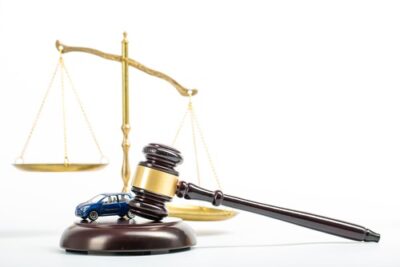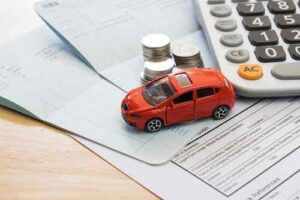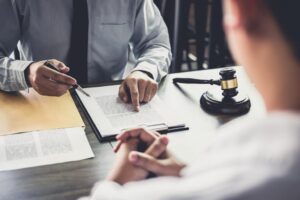
Car accidents often result in personal injury settlements for those who were injured. But what if you weren’t one of the drivers in the accident? Whether you were a passenger or someone else was driving your car, you’re probably concerned about your part in the legal process. Is there any risk of legal action being taken against you?
In most cases, you don’t need to worry about having legal action taken against you if you weren’t a driver in a car accident. But there are a few rare situations where you might face the consequences if you weren’t driving after an accident. Contact an Atlanta car accident lawyer at John Foy & Associates for more information.
Understanding Non-Driver Liability in Georgia
Regarding non-driver liability in Georgia, understanding the laws can be quite complex. If you weren’t the driver during an accident, it’s important to know your rights and the legal actions you may face. In Georgia, non-driver liability can arise in various situations. For example, when you own the vehicle involved in the accident, you are the driver’s employer or entrusted your vehicle to someone else.
One key factor in understanding non-driver liability is determining who is at fault for the accident. Georgia follows a modified comparative negligence system, meaning that liability can be shared among multiple parties based on their percentage of fault. Gathering as much evidence as possible to prove your innocence and protect yourself from liability is crucial.
Laws on Owner Liability for Vehicle Collisions
Additionally, it’s important to understand Georgia’s laws on owner liability for vehicle accidents. The state holds vehicle owners responsible for accidents caused by anyone with their permission to drive their vehicle. This can lead to legal consequences if the person driving your vehicle is involved in an accident.
Understanding non-driver liability in Georgia allows you to confidently navigate the legal landscape and protect yourself from unnecessary legal actions.
Get the strong arm
Factors that Determine Liability in a Car Crash
When determining liability in a car accident, several factors come into play. The first and most obvious factor is negligence. Negligence refers to the failure to exercise reasonable care while driving. This can include actions such as:
- Distracted driving
- Reckless driving/speeding
- Running lights
- Texting while driving
- Eating while driving
- Poor vehicle maintenance
- Traffic violations
- Drunk driving or driving under the influence of drugs
Witness testimony and evidence can also play a significant role in determining liability. Eyewitnesses who saw the accident can provide valuable information about how the accident happened and who may be at fault. Additionally, physical evidence, such as skid marks or vehicle damage, can be used to reconstruct the accident and determine fault.
Ultimately, determining liability in a car accident can be a complex process. It often requires a thorough investigation and the consideration of multiple factors. Suppose you find yourself involved in an accident and are unsure about liability. In that case, it’s important to consult with a qualified attorney who can guide you through the legal process after filing a police report with a police officer.
Can I Be Sued if I Was a Passenger in a Car Crash?
When injuries and other additional damages (including medical expenses or funeral expenses in a fatal accident) result from a car accident in an at-fault state like Georgia, the person who was negligent (or careless) and caused the accident is responsible for the costs. That means the accident victims can submit a claim to the at-fault driver’s auto insurance company or sue them for non-economic and monetary damages.
When two cars get into an accident, one of the drivers is usually at fault and responsible for damages. In some cases, both are liable. It’s uncommon for a passenger to be found to be at fault for a car accident, but it is possible.
When a Passenger Could Be at Fault
To be found at fault as a passenger, you must actively interfere with the driver’s ability to control their vehicle. For example, say you were a front passenger and, during an argument, you reached over and grabbed the driver’s steering wheel. You jerked the wheel to the right, causing the car to swerve off the road or into another traffic lane. As a result, the driver was seriously injured, and the car was totaled.
In the above situation, you could be liable because the accident wouldn’t have happened if you hadn’t grabbed the wheel. Suppose other factors led to the accident scene, like if the driver was also speeding. That could also affect your percentage of fault. But in this situation, it would be possible for the driver (or another driver if the vehicle you were in hit their car and caused injuries) to take legal action against you.
Other Instances
However, there are other instances where you might distract the driver but wouldn’t be found at fault. For example, if you said something to them and they looked away from a busy road and crashed, the fault would still be on the driver. Even though you spoke to them, they didn’t have to look away from the road.
How to Protect Yourself from Liability as a Non-Driver in Georgia
Car accidents can be a stressful and confusing experience, especially if you weren’t the driver at the time. Understanding non-driver liability laws in Georgia is crucial to protect yourself from unnecessary legal actions. Here are some important steps to protect yourself from liability as a non-driver in Georgia.
- Have an insurance coverage policy: Always make sure you have a comprehensive auto insurance policy with a quality insurance company that covers you as a non-driver. This can provide you with the necessary financial protection in case of any accidents or damages, including property damage.
- Be cautious when lending your vehicle: Only allow responsible and experienced drivers to use your car. Ensure they have a valid driver’s license and adequate coverage with your insurance company. This can help minimize the risk of accidents and potential legal consequences.
- Maintain your vehicle: Complete regular maintenance to reduce the chances of mechanical failures or other issues that could contribute to an accident. Keeping your car in good condition demonstrates that you have taken reasonable care to prevent any accident.
- Hire an attorney: Consult an experienced car accident attorney specializing in non-driver liability cases. They can guide you through the legal process, gather evidence to support your innocence and protect your rights.
Remember, being proactive and knowledgeable about Georgia’s non-driver liability laws can help you confidently navigate the legal landscape and protect yourself from unnecessary legal actions.
What if My Car Was Involved in an Accident, but I Wasn’t Driving?
If your car was in an accident, you could be held liable even if you weren’t physically in the said accident. There are a few different ways you may face a personal injury lawsuit if someone else was driving your car and wrecked.
Negligent Entrustment
All drivers are legally obliged not to put others in danger on the road. If you entrust your car to a person unfit to drive (i.e., they were driving recklessly or drunk), you could be accused of negligent entrustment.
Georgia also recognizes the family purpose doctrine, which holds the owner of a vehicle liable if an injury or death happens that a family member living in their house caused. For example, if a parent’s teenager is at fault for an accident and the other driver is hurt or killed, the parent could be held liable.
Vicarious Liability
Suppose you are an employer who allows an employee to drive a company vehicle and get into an accident that leads to injuries or damages. In that case, you may be responsible as a business owner. This is known as vicarious liability. However, your liability can depend on factors like whether or not the employee was on the clock during the accident and more.
Another example of this could be loaning your car to someone you know is an unsafe driver or has a bad driving record. If that driver gets into an accident in your vehicle, you could be held responsible because you knowingly let them drive despite their history.
Despite the situations above, merely owning a vehicle does not automatically make you liable for the driver’s negligence. If you’re unsure, it’s best to contact an experienced car accident lawyer who can tell you what to expect based on your circumstances.
What If I Was Injured as a Passenger?
While there are certain circumstances where you could face legal action in a car accident where you weren’t the driver, we most commonly see the opposite scenario. Often, a passenger is injured in an action and makes a claim or takes legal action against one or more drivers.
If you were hurt in a car accident as a passenger, you may be entitled to financial recovery from one or both of the drivers, including the driver of the car you were in. You will want to contact a personal injury lawyer and explain your situation so they can determine your best course of action.
Employer Liability for Employee’s Car Accidents in Georgia
Georgia employers can also face liability for their employee’s actions. This is known as employer liability for employee car accidents. The employer may be liable for damages or injuries if an employee is involved in a car accident while performing their job duties.
Employer liability can arise in various situations, such as:
- When an employee is driving a company vehicle.
- Using their personal vehicle for work purposes.
- Running errands for their employer.
The key factor in determining employer liability is whether the employee acted within the scope of their employment at the time of the accident.
Establishing Employer Liability
To establish employer liability, you must prove that the employee acted in the course and scope of their employment. This means that the employee must have been engaged in work-related activities or performing tasks on behalf of their employer at the time of the accident.
However, it’s important to note that not all accidents involving employees will result in employer liability. If an employee uses their personal vehicle for personal reasons during their own time, the employer may not be held liable for any accidents.
Protection for Employers
Employers should have comprehensive policies regarding employee vehicle use to protect themselves from employer liability. These policies should outline guidelines for employees when using company vehicles or their personal vehicles for work purposes.
Employers should also ensure that employees have valid driver’s licenses and appropriate coverage with their insurance company.
Talk to a Car Accident Lawyer for Free Today
It’s rare to face legal action if you weren’t a driver in an accident, but it’s not impossible. Never take blame or speak to anyone until you’ve spoken to a car accident lawyer who can look at the entire situation.
Our attorneys at John Foy & Associates can help. For more than two decades, we’ve been helping car accident victims seek the financial recovery they need to cover costs and move on from their accidents.
If you need help in the aftermath of your accident, you can get a FREE consultation about your case. Contact us now to speak with a personal injury attorney about pursuing financial compensation.
(404) 400-4000 or complete a Free Case Evaluation form





